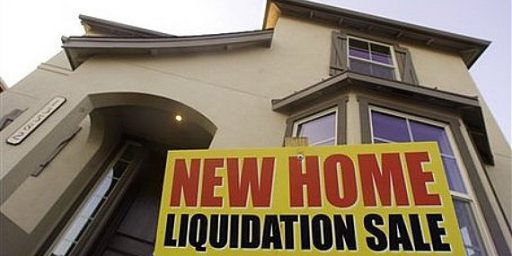Interest Only Mortgages ‘Risky’
Interest only mortgages, which are becoming increasingly popular, are “risky,” economists warn.
Many Buyers Opt for Risky Mortgages (WaPo, A1)
More than a third of the mortgages written in the Washington area this year are a risky new kind of loan that lets borrowers pay back only the interest, delaying for years repayment of any loan principal. Economists warn that the new loans are essentially a gamble that home prices will continue to rise at a brisk pace, allowing the borrower to either sell the home at a profit or refinance before the principal payments come due.
The loans are attractive because their initial monthly payments are tantalizingly low — about $1,367 a month for a $320,000 mortgage, compared with about $1,842 a month for a traditional 30-year, fixed-rate loan. If home prices fall, though, borrowers could lose big.
[…]
Mark Zandi, chief economist of Economy.com, said buyers are turning to interest-only loans because real estate has become so expensive — but that real estate is becoming so expensive partially because of the use of these new products. “It largely reflects the inability of families to afford a home with a plain-vanilla mortgage,” Zandi said. “This is a way for people to get into what are extremely expensive homes.”
The second trust on my home is interest only, for precisely that reason. In a market where a decent sized townhouse goes for $400,000 people have to take on unwieldy loans just to get in the door. Home ownership is almost a prerequisite to financial security and one needs to start somewhere on the ladder, breaking the rental cycle.
I’m at the point now where, because my property has appreciated in value roughly $100,000 in the 18 months since I bought it, that I have sufficient equity to refinance into a loan without PMI. When I bought the place initially, though, it took some creative financing just to get a loan (or, as it were, two loans).
Related:





“In a market where a decent sized townhouse goes for $400,000 people have to take on unwieldy loans just to get in the door. Home ownership is almost a prerequisite to financial security and one needs to start somewhere on the ladder, breaking the rental cycle.”
That’s a very dangerous statement. People who did this a year ago obviously lucked out, homes are up 15% since last year on average (and higher in hot markets), but when the year comes that homes are down 15% and interest rates rise, this will lead those who took “unwieldy loans” into financial ruin.
HS: Perhaps. One has to take calculated risks, though. The longer one waits to get into a home, chances are, the higher the price will be and thus the further out of reach.
Has this ever happened since 1931?
Prices have gone down several times on a regional basis. Ones that immediately come to mind are Miami in the mid-80s, and Southern California in the 90s.
The DC near suburbs (inside the Beltway, not in the District) have a demographic issue coming up later this decade. Many of the houses belong to governmet workers and supporting contractors who will be retiring enmass 2007-2012 (there is a GAO study on the wave of retirements), Most of them could not afford to buy the houses they live in at today’s prices, and for many, their house is most of their net worth. Many will decide to retire to rural Virginia or Florida where living is cheaper. There is a significant chance that IF a bunch of these 1400 sq ft ramblers ($700,000+) in Arlington and Annandale come on the market, supply will exceed demand and prices go down. Right now only a few turn over, and aided by low interest rates, prices are high. It is never guaranteed that will continue.
The line “Home ownership is almost a prerequisite to financial security and one needs to start somewhere on the ladder, breaking the rental cycle” is quite true. The problem lies, as usual, in the irresponsibility of many home buyers: they simply use the interest-only loan to buy a house that is within their current means, but will demand too much once principal or a balloon payment comes due.
Of course, certain markets such as California’s are odd cases, as there are few people who ever own their homes outright. Interest-only loans have been around these areas for quite some time and are nothing new. I think these markets are starting to approach the realm of speculation, however, as there is an increasing percentage who are purchasing on short term interest payments. At some point, one would think, there will be a large number of sellers coming to the housing market soon.
Of course, this is only a problem if there are too few buyers. I know that while Santa Barbara is considered by some to be highly inflated, there are people in Malibu who consider Santa Barbara’s prices to be deflated. It’s all relative to how many buyers are present and what price they are willing to pay.
McGehee, absolutely. I remember the northeast real estate crash in the eighties. There were people walking away and leaving their houses to the banks when they couldn’t afford to pay for them and it was hardly worth trying because they owed far more than they were worth.
In the long term, housing is a great investment. In the recent market many places, it’s even been a good short term thing, but that’s actually a sign of it starting to bubble. As is the heavy growth of something as utterly insane as interest only mortgages. Next thing you know we’ll have Japanese-style multi-generation mortgages, or 99 year ones, or whatever, that IIRC were especially big when their bubble burst.
Some of us make more money than our parents and grandparents ever dreamed of, yet find it daunting to afford $1000 in rent and cognitatively discontinuous to ponder $2000 for a mortgage payment.
I think some regions are probably in for a housing price drop, but often the areas with the highest housing markets are in areas that still have a lot of demand for living there, they probably won’t drop that much.
That said I haven’t ever lived anywhere that the housing market was that bad, and I wasn’t even aware of interest only loans until I saw this post and another on on another blog recently.
There are mortgage businesses in metro Atlanta promoting every kind of mortgage under the sun, but I think that’s because around here home ownership has extended to every conceivable income level and this area has been booming (by standards applicable everywhere else, at least) even during the tech bust.
My wife and I have refinanced twice but that was to take advantage of rock-bottom interest rates; we don’t even have a good ballpark idea what our house would list for if we put it on the market now, but at any rate most of any gain we’d be counting on from such a sale would be because we’ve been laying on extra equity when we make our mortgage payments. Also, while our original note was a 30-year, we’re now on a 15.
If we sold, and wanted to exploit the resulting down payment to max out what we could afford to pay monthly, and went with a 30-year mortgage, we could have enough house for four or five generations of both sides of our families.
Which we’d need to have living with us, just to keep the lawn mowed.
James,
I would suggest you refinance. Unlike most, I first heard of interest-only loans a number of years ago; it’s not a new scam deal. In fact, I’ve seen even negative-equity loans (your balance went up while you paid). The mere thought of the latter made me shudder.
Get out while the getting is still good.
During the Great Oil Bust in the 1980s, housing prices in Oklahoma dropped dramatically. I sold a house in early 1982, a few months before the failure of Penn Square Bank and the attendant collapse of the local economy, for $59,900; it was resold seven years later for $28,600.
Wow, someone invoking Penn Square Bank. I remember it well. Unemployment in Tulsa went from sub 3% in the summer of ’82 to well over 10% by the start of 1984. Housing prices thusly cratered.